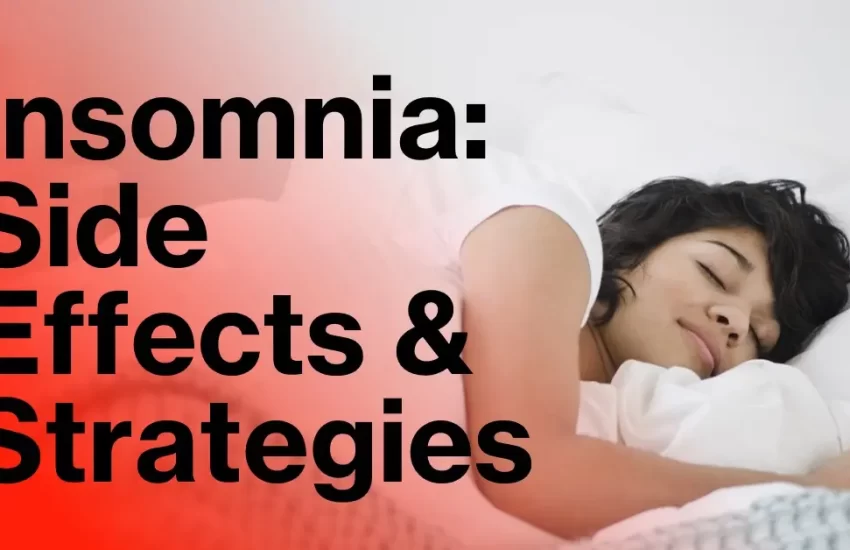Introduction:
Insomnia, a prevalent sleep disorder characterized by difficulty falling asleep, staying asleep, or experiencing restorative sleep, poses significant challenges to individuals’ health and well-being. Beyond the immediate repercussions of sleep deprivation, chronic insomnia can precipitate a myriad of adverse effects on physical, cognitive, and emotional health can be cure with Lunesta 3mg. This article delves into the multifaceted side effects of insomnia and explores evidence-based strategies for its effective management and cure.
The Side Effects of Insomnia:
- Physical Health Implications: Insomnia is intricately linke to a plethora of physical health consequences, including:
- Weakened Immune Function: Sleep deprivation compromises the immune system, rendering individuals more susceptible to infections and illnesses. Studies have shown that insufficient sleep can reduce the production of cytokines, proteins that help fight infection and inflammation.
- Cardiovascular Complications: Chronic insomnia increases the risk of hypertension, heart disease, and stroke, attributable to disrupted autonomic function and elevate inflammatory markers. Sleep disturbances contribute to endothelial dysfunction, arterial stiffness, and dysregulate sympathetic activity, culminating in adverse cardiovascular outcomes.
- Metabolic Dysregulation: Sleep disturbances disrupt glucose metabolism, predisposing individuals to insulin resistance, obesity, and type 2 diabetes. Insomnia impairs insulin sensitivity, promotes dyslipidemia, and alters appetite-regulating hormones, fostering a metabolic milieu conducive to weight gain and metabolic syndrome.
- Increased Pain Sensitivity: Sleep deprivation exacerbates pain perception and diminishes pain tolerance, exacerbating chronic pain conditions such as fibromyalgia and migraines. Heightene pain sensitivity is mediated by alterations in pain processing pathways, amplification of nociceptive signaling, and dysregulation of endogenous pain modulatory systems.
-
Cognitive Impairment:Insomnia exerts a profound toll on cognitive function, manifesting as:
- Impaired Concentration and Memory: Sleep deprivation impairs attention, working memory, and cognitive processing speed, compromising academic and occupational performance. Insomnia-induce cognitive deficits are attributed to disrupte prefrontal cortical function, impaired hippocampal neurogenesis, and dysregulated neurotransmitter systems implicated in learning and memory.
- Executive Dysfunction: Insomnia compromises decision-making, problem-solving, and impulse control, exacerbating risk-taking behaviors and impairing judgment. Executive dysfunction stems from impaire prefrontal cortical inhibition, disrupted dopaminergic signaling, and aberrant activation of limbic structures implicated in emotional regulation and reward processing.
- Cognitive Decline: Chronic insomnia accelerates age-related cognitive decline and increases the risk of neurodegenerative disorders such as Alzheimer’s disease. Sleep disturbances exacerbate amyloid-beta accumulation, tau hyperphosphorylation, and neuroinflammatory cascades, fostering neuronal injury, synaptic dysfunction, and cognitive impairment characteristic of neurodegenerative pathology.
-
Emotional Disturbances: Insomnia engenders a cascade of emotional upheavals, including:
- Mood Disorders: Sleep deprivation amplifies emotional reactivity, precipitating irritability, mood swings, and dysphoria, predisposing individuals to depression and anxiety disorders. Insomnia-induced mood disturbances are mediated by dysregulated amygdalar function, blunted prefrontal cortical inhibition, and altered serotoninergic and noradrenergic neurotransmission implicated in affective regulation.
- Heightened Stress Response: Insomnia exacerbates physiological stress responses, characterized by elevated cortisol levels, sympathetic arousal, and allostatic load, contributing to chronic stress-related disorders. Sleep disturbances dysregulate the hypothalamic-pituitary-adrenal (HPA) axis, disrupt autonomic balance, and compromise resilience to psychosocial stressors, fostering a maladaptive stress response repertoire.
- Impaired Emotion Regulation: Sleep disturbances compromise emotion regulation strategies, exacerbating emotional lability, impulsivity, and maladaptive coping mechanisms. Insomnia-induced deficits in cognitive control, attentional bias towards negative stimuli, and diminished emotional awareness impair adaptive emotion regulation strategies, perpetuating mood instability and psychological distress.
Effective Management and Cure of Insomnia:
- Cognitive-Behavioral Therapy for Insomnia (CBT-I): CBT-I, a gold-standard psychotherapeutic intervention, targets maladaptive sleep habits, dysfunctional beliefs about sleep, and behavioral patterns perpetuating insomnia. Key components of CBT-I include sleep restriction therapy, stimulus control, relaxation techniques, and cognitive restructuring, fostering sustainable improvements in sleep quality and quantity.
- Sleep Hygiene Practices: Implementing optimal sleep hygiene practices can promote a conducive sleep environment and enhance sleep-wake regularity. Recommendations include maintaining a consistent sleep schedule, creating a relaxing bedtime routine, optimizing bedroom ambiance (e.g., temperature, lighting, noise), limiting caffeine and electronic device usage before bedtime, and fostering a comfortable sleep environment.
- Pharmacological Interventions: Pharmacotherapy may be indicated for individuals with severe or refractory insomnia, albeit with caution due to the risk of tolerance, dependence, and adverse effects associated with long-term usage. Short-term use of hypnotic agents such as zolpidem, eszopiclone, or temazepam may be considered under medical supervision, complementing non-pharmacological interventions to alleviate acute sleep disturbances.
- Mindfulness-Based Interventions: Mindfulness-based interventions, encompassing mindfulness meditation, yoga, and mindful movement practices, offer promising adjunctive strategies for managing insomnia. By cultivating present-moment awareness, acceptance, and non-judgmental attitudes towards sleep-related thoughts and sensations, mindfulness practices attenuate hyperarousal and promote relaxation conducive to sleep onset and maintenance.
Conclusion:
Insomnia exacts a profound toll on physical, cognitive, and emotional well-being, underscoring the imperative of proactive intervention and comprehensive management strategies. By addressing the underlying contributors to insomnia and implementing evidence-based interventions encompassing cognitive-behavioral, behavioral, pharmacological, and mindfulness-based approaches, individuals can mitigate the adverse effects of insomnia and embark on a path towards restorative sleep and optimal health.
